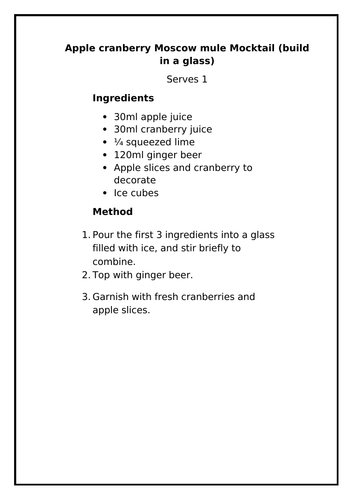



4 mocktail recipes to be made during a practical lesson of Hospitality studies (one for each of the 4 mixing techniques).
A PowerPoint designed for use in a theory lesson which goes through a range of beverages and their preparation steps. It begins by explaining what mocktails are. It goes through some of the carbonated beverages and soft drinks commonly used in mocktails. There are images of a range of kitchen utensils commonly used when making mocktails. This is followed by an explanation of the 4 techniques used to make mocktails (build in a glass, shake n strain, stir in a jug and blend.) Example mocktails for each preparation type are provided. this is followed by information about different glassware including lowball glass (tumblers), martini glass, hurricane glass and margarita glass. The lesson then moves onto other beverages common to cafes and restaurants. It begins with common fruit juices, handcrafted sodas, frappes, iced teas. This is followed by a range of milk-based beverages including: smoothies, milkshakes, flavoured milks, hot chocolates, iced coffees. This is followed by a run down of the various types of teas organised under categories: black, green, oolong, Ceylon, herbal, floral and fruity. This is followed by information about non-espresso coffee types: instant, plunger, percolator, filter, pods and Turkish.
Also included is a PPT (at the base of the original PPT) about how to write procedural texts. It includes the three elements of a procedural text, an example for how to make pancakes, some tips for writing a procedural text and some activities for writing procedural texts for beverages they are learning about (coffees).
There is also a 13 minute ClickView video with 9 viewing questions for if time permits.
Resources designed for use in an 11 Hospitality Practices class in Australia (2019 curriculum). Unit 1: Introduction to Hospitality, Topic 1: Beverage operations and services. My school has 70-minute lessons. The assessment at the end of this unit was an examination (short response).
Something went wrong, please try again later.
This resource hasn't been reviewed yet
To ensure quality for our reviews, only customers who have purchased this resource can review it
Report this resourceto let us know if it violates our terms and conditions.
Our customer service team will review your report and will be in touch.